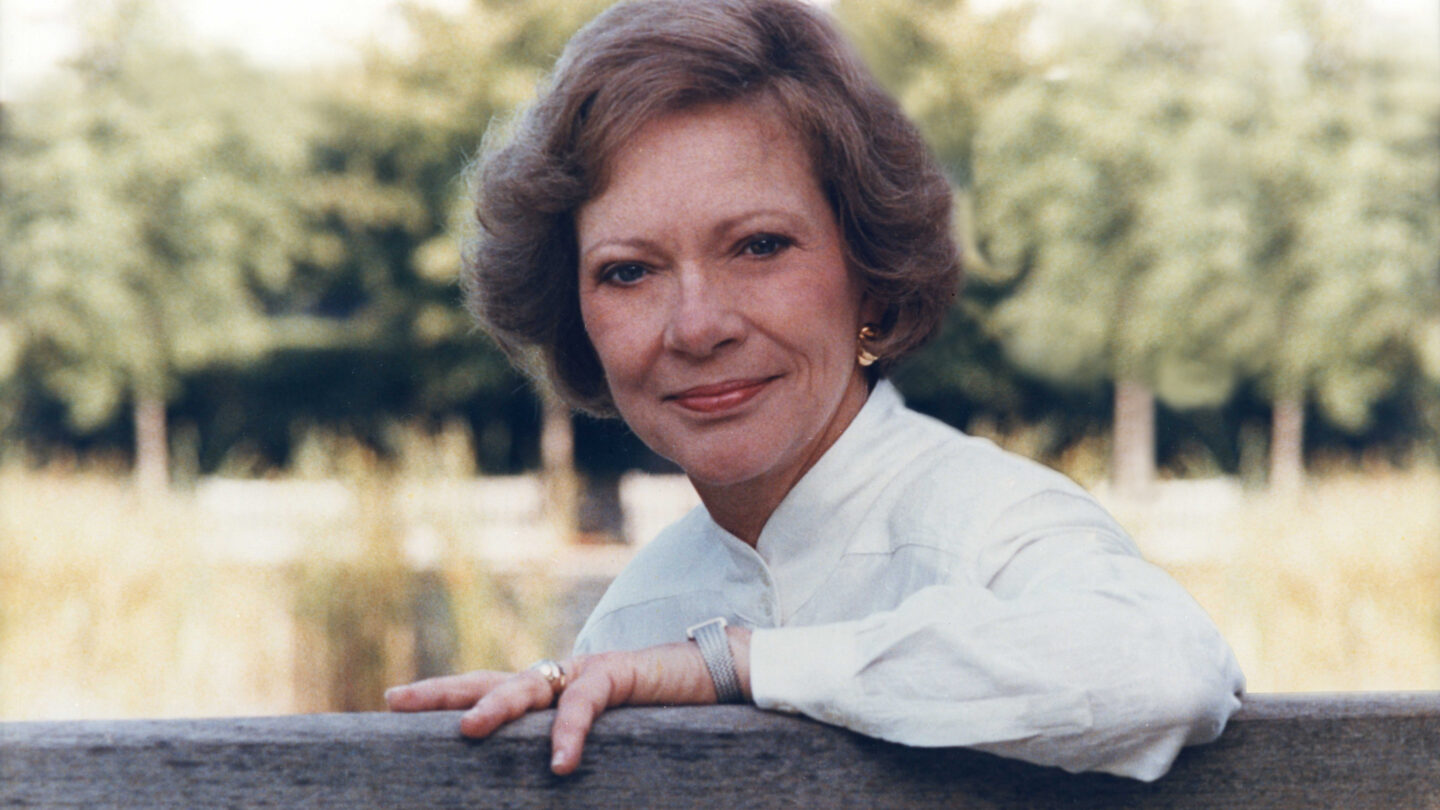La First Lady Rosalynn Carter, di 96 anni, è deceduta | Vanity Fair

Di Mimi Swartz
È difficile ricordare ora, a causa sia delle sfumature rosate del tempo sia delle personalità e delle cadute delle successive Prime Donne, ma Rosalynn Carter, moglie di Jimmy Carter, il 39° presidente degli Stati Uniti, era una donna tosta. La storia ha smussato i suoi lati così che molti la ricordano, vagamente, come una dolce donna del sud ma robusta, se non una belle, almeno qualcuno che sembrava abbastanza simpatica ma non una triunfatrice, niente come l'eternamente osteggiata Hillary Clinton o la supremamente sicura Michelle Obama.
Parte di questa eredità fuorviante ha a che fare con un pregiudizio geografico. Rosalynn Carter - che è deceduta domenica all'età di 96 anni dopo essere stata diagnosticata con la demenza - proveniva da una piccola città della Georgia, come suo marito, e una volta insediati nella residenza del 1600 Pennsylvania Avenue, il Washington politico è stato colpito da un grave caso di quello che lo scrittore Nicholas Lemann ha chiamato rubofobia. I Carter venivano considerati come persone ignoranti, semplicemente. Parlavano con accenti del sud. Avevano una coltivazione di arachidi. Rosalynn indossava lo stesso vestito che aveva indossato al ballo per l'insediamento del marito come governatore della Georgia nel 1971 per la sua festa presidenziale nel 1977. (Peggio ancora, proveniva da un posto chiamato Jason's in un luogo chiamato Americus, Georgia.) La coppia vietava gli alcolici dalle cene alla Casa Bianca. "Semplicemente non ne ho voglia", disse Rosalynn a un scettico reporter del The New York Times. "Non per motivi religiosi. Semplicemente non ne ho voglia. Inoltre, sto risparmiando i soldi dei contribuenti". In effetti, i Carter erano anche molto devoti alla preghiera e, forse peggio ancora agli occhi dei detrattori, erano sinceri nella loro fede. Forse non sorprende che gli eccessi degli anni Reagan siano stati una sorta di sollievo dopo i Carter, e che la reputazione di fuddy-duddy di Rosalynn persista ancora oggi.
Ma in realtà non era così. È utile ricordare che nel 1977 e nel 1979 un sondaggio Gallup ha designato Rosalynn come la donna più popolare al mondo tra gli americani, e nel 1980 ha condiviso lo stesso titolo con Madre Teresa, la cui reputazione è poi stata colpita. Leggendo diverse biografie negli ultimi giorni, ciò che emerge maggiormente è come Rosalynn Carter sia riuscita a essere sia compagna che individuo. Era una donna di una generazione che poteva (quasi ma non del tutto) operare autonomamente, un ponte tra le Prime Donne che erano aiutanti silenziose e quelle che potevano (quasi) agire come individui a tutti gli effetti. Anche se non è spesso noto, i Carter hanno anticipato l'accordo-pacchetto successivamente offerto da Bill e Hillary Clinton.
Era la persona giusta al momento giusto per quel cambiamento sociale. Eleanor Rosalynn Smith (pronunciato "Rose-a-lynn", mai "Roz-a-lynn") è cresciuta in modesta condizione a Plains, Georgia, indossando abiti fatti dalla madre sarta. Era devota al padre, un meccanico di automobili e autista di autobus, che l'ha incoraggiata ad eccellere al liceo, cosa che lei ha fatto, e a andare all'università e trovare orizzonti più ampi. Lui è morto di leucemia quando Rosalynn aveva 13 anni, e lei era determinata a realizzare i suoi desideri per lei. ("La mia infanzia è davvero finita in quel momento", ha scritto più tardi nella sua autobiografia, First Lady from Plains, del momento in cui lui le ha parlato della sua malattia.)
Il cammino verso quel mondo più ampio è apparso sotto forma di uno studente dell'Accademia Navale degli Stati Uniti di nome James Earl Carter Jr., con cui ha cominciato a frequentarsi nel 1945. (Si erano conosciuti anni prima, quando Carter aveva tre anni, e sua madre, un'infermiera intraprendente che sarebbe stata conosciuta come "Miz" Lillian, l'aveva aiutata a partorire Rosalynn.) La loro storia d'amore al primo sguardo è diventata un tema ricorrente nei resoconti giornalistici a partire dal momento in cui Jimmy ha iniziato la sua carriera politica, e, quando è stato eletto presidente, faceva parte di un romanticismo di cui i giornalisti di costume vanno pazzi. Questa storia ha una longevità perché era vera. Sì, Rosalynn è stata furiosamente contrariata quando, nel 1953, Jimmy ha abbandonato la carriera navale (e i viaggi che lei amava) per gestire la coltivazione di arachidi della famiglia a Plains dopo la morte del padre di Carter. Tuttavia, questo è stato l'inizio della collaborazione che alla fine ha portato Jimmy al Senato dello Stato della Georgia e poi alla residenza del governatore. "Abbiamo sviluppato una partnership quando lavoravamo nel settore dei fornitori di agricoltura, e è continuata quando Jimmy si è coinvolto in politica", ha detto Rosalynn all'Associated Press. "Sapevo di più su carta riguardo all'attività di lui. Prendeva il mio consiglio su molte cose." Jimmy non ha mai discusso. "La cosa migliore che abbia mai fatto è sposare Rosalynn", ha detto in un'intervista al Carter Center nel 2015. "È il vertice della mia vita."
Rosalynn Carter accanto a suo marito, Jimmy Carter.
That kind of alliance was relatively new in the 1970s. Rosalynn was willing to take on the traditional First Lady duties, like picking a noble cause and promoting it. (Hers was mental health.) She managed the lives of the four Carter children—some of whom moved into the White House, with spouses—and established a precedent by requesting that the press leave her youngest child, Amy, then nine, out of the news. (A lot of grousing ensued at the time.)
Simultaneously, Rosalynn served as a true partner in her husband’s presidency. She applied herself like the A student she had been in high school, studying briefings, sitting in on cabinet meetings, taking notes, serving as an all-purpose adviser, rewriting dry speeches, heading diplomatic trips, and sharing her opinion during pillow talks. She was the first First Lady to have her own office in the East Wing and was not happy with media accounts that suggested she didn’t know how to throw a proper dinner party. (After all, she had been First Lady of Georgia.)
Then there were her diplomatic duties. President Carter was famously thin-skinned, and grew more so as his political capital declined—it went from a high of 75% in 1977 to a 28% low in 1979. Aides came to learn that Rosalynn was the lone confidant who truly had his ear. “She was the only person who could talk to Jimmy with total frankness because he knew she had his back,” the author Lawrence Wright, who has written extensively about the Carters, told me. “People who worked for him talked about how prickly and how stern he was, but she just went right past that.”
Still, Rosalynn got testy herself when her husband referred to her in The New York Times as “a perfect extension of myself.” She wasn’t interested in being an extension of anyone. “You can make the First Lady’s job whatever you want it to be,” she said at the time. “To some women, the job is more involved with the entertaining. They feel at home doing the things at home. I’ve always worked. I can’t stay at home and do Cokes and teas, although I think that for those people who want to do that, then that’s surely important to them.” (Rosalynn’s qualifier probably saved her from the drubbing Hillary Clinton got for saying nearly the same thing in 1992.) Rosalynn worked hard with former First Lady Betty Ford to back the passage of the Equal Rights Amendment, and its failure to be enacted was one of the biggest disappointments of her White House years.
If Jimmy Carter became known for redefining a former president’s post-presidential years as one of activism and good works, Rosalynn deserves equal credit. Their teamwork continued with the creation of the Carter Center, the goal of which is to advance human rights and improve health, and the couple traveled the world monitoring elections, helping to eradicate disease, and supporting the growth of democratic institutions. In the US, they supported Habitat for Humanity, building homes in underserved areas. The only thing they didn’t share was the 2002 Nobel Peace Prize, which went to her husband alone, an indication that even the closest partnerships can only go so far.
Undaunted, Rosalynn kept at her good works. She continued to be an advocate for mental health, establishing, among other things, the Rosalynn Carter Institute for Caregivers. Perhaps more importantly, she successfully fought for insurance coverage of mental illnesses, which passed Congress in 2008.
The Carters celebrated their 75th wedding anniversary in 2021 with a big bash back in Plains, when she was 93 and Jimmy 96. He attributed the success of their marriage to mutual interests that included bird watching and shared Bible reading. I attribute it to a woman who found a balance between being a loyal wife and being loyal to herself.
As the end came closer, they seemed to be going their separate ways. Jimmy opted for hospice care at home after a series of health crises, while Rosalynn slipped into dementia. Then, by this November, she too became a residential hospice patient. They had put away their twin StairMasters and settled into twin recliners, waiting for one of the few things they couldn’t pursue together.




